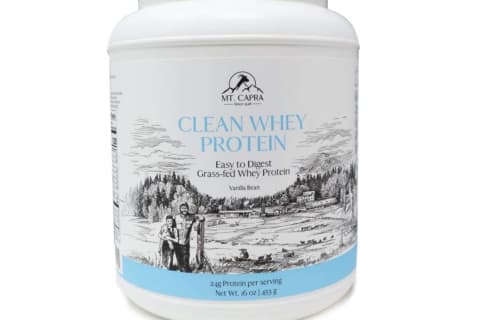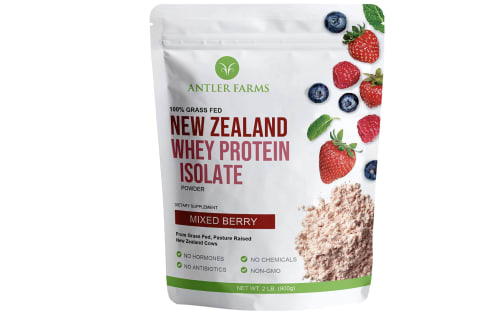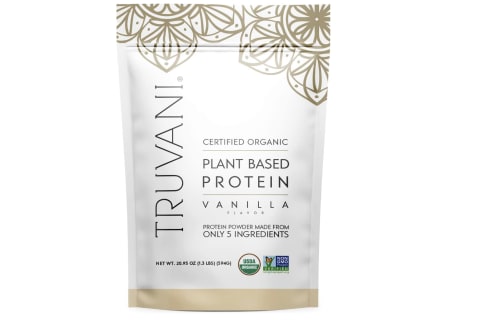Advertisement
When To Consume Protein Powder: Research-Backed Timing Tips


Protein is an essential macronutrient that fuels a lot more than just #gains. Composing about 15% of our 1body weight, protein helps build teeny tiny cells, large joints and organs, and everything in between. It plays a role in your energy levels, immune function, and metabolic health, too.
Your body is always breaking down protein, so it needs a consistent supply from your diet. But is there a certain time of the day that's considered best for refueling? Let's explore the best times to consume protein powder so it works the hardest for you.
Why you should spread out your protein intake.
Before you think about timing your protein to a tee, you'll need to make sure you're getting enough of the macronutrient in the first place.
Most active people will want to consume around 1.4 to 2.0 grams of protein per kilogram of body weight2. If you weigh 165 pounds, that's around 105 to 150 grams of protein per day.
By hitting this threshold, you're ensuring that your body has enough protein to build muscle, support metabolism and insulin sensitivity, and more.
"The most important part, it seems based on the research, is total protein intake in a day," says Shawn Arent, Ph.D., a professor of exercise science at the University of South Carolina. "You can time the crap out of your protein, but if you're not eating enough per day, it's a drop in the bucket."
Ideally, you'll be able to meet your protein needs by eating whole-food protein sources. However, protein powders can be a convenient way to fill gaps in the diet and get a meaningful amount of protein without needing to fire up your stove.
Rather than trying to cram 100+ grams of protein into one meal (that's a lot of eggs and whey), you'll want to spread your protein intake throughout the day—starting with breakfast.
The first meal of the day is important because when you're sleeping, your body is in a catabolic state in which muscle tissue is broken down for its constituent amino acids. And you'll stay in this state until you replenish your body with the amino acids it needs to enter an anabolic state and rebuild muscle again—a process called muscle protein synthesis (MPS).
"The first meal after you're coming out of an overnight fast is absolutely critical," Don Layman, Ph.D., a leading protein and amino acid researcher and professor at the University of Illinois at Urbana-Champaign, previously told mindbodygreen. "Until you have a meal that triggers MPS, you'll stay catabolic."
And what sets off MPS and gets us into an anabolic state? You guessed it: protein. Layman's research has found that consuming an adequate serving of protein (at least 20 to 30 grams) starting at your first meal of the day3 will support muscle protein synthesis more effectively than eating the majority of your protein at dinner. It will also set you up to fulfill that all-important daily protein quota.
As long as you're consuming enough protein a day4, and spreading it across a few meals and snacks, the exact hours of your protein intake don't matter as much. However, there are some ways to optimize your timing slightly depending on your specific goals.
Summary
Protein to lose weight.
If you're looking to lose weight (while maintaining muscle mass), consuming protein powder in the morning can be beneficial.
Not only will it kick-start MPS, but protein is also highly satiating, meaning it can help you start your day feeling full and satisfied.
It also has what's known as an insulinotropic effect5, so it helps clear glucose from your blood and can assist with stabilizing blood sugar. "Less insulin spiking means more sustained energy levels and fewer hunger pangs throughout the day," Gabrielle Lyon, D.O., a functional medicine physician and the founder of the Institute for Muscle-Centric Medicine, previously told mindbodygreen.
In research on adolescents with obesity6, eating a high-protein breakfast (35 grams) helped prevent fat gain and reduce daily hunger more than eating a lower-protein breakfast or skipping breakfast altogether.
If fat loss is your goal, you'll want to get plenty of exercise—particularly strength training—daily too.
Pairing a protein-rich diet with intermittent fasting has also been shown to promote fat loss and improved metabolic health in recent research7, likely due to the way that restricting your eating window can reduce calorie intake. (Just note that this strategy is not effective for everybody and may be unsafe for pregnant and breastfeeding women or anyone with a history of an eating disorder. Talk to your doctor before trying it.)
Summary
Should I consume protein before or after exercise?
There's a reason the stereotypical weightlifter follows up every gym session with a protein shake. Eating protein after a workout helps refuel the body and restore muscle tissue that was damaged during exercise.
The "anabolic window of opportunity" is the amount of time post-workout that your body is primed to synthesize new proteins. Researchers used to think this time window was relatively short—around 30 to 60 minutes—but this notion has since been challenged8.
"The reality is that the window is more like a garage door—it's much bigger than we thought it was," Arent explains. "If you don't eat protein right after a workout, it's not like you're going to lose all the hard work you just put in."
So if you forgot to bring your shake to the gym, it's fine to wait until you're home and showered to refuel with protein as well as some carbs.
Whether you eat protein one hour after a workout or three, research shows the effects on MPS will be similar9. One exception is if you work out first thing in the morning without eating beforehand. In that case, you'll want to refuel quickly10 because you may still be in a more catabolic state.
As for the benefits of eating protein before a workout, the research is more mixed and it seems to depend on the person. There are some early studies suggesting that pre-workout protein might be more important for women11, but we don't know for sure.
Summary
Should I consume protein in the morning or at night?
As we've already covered, eating protein in the morning or during your first meal is key for getting your day off on the right foot.
However, emerging research is also finding that consuming a concentrated dose of protein right before bed can be helpful for heavy exercisers. One 2019 study published in Frontiers of Nutrition12 found that for those who were doing a prolonged period of resistance training, consuming 40 grams of protein before bed stimulated MPS during the overnight recovery period—a time when muscle would usually be breaking down.
This can also be a smart strategy for athletes with very high protein needs who would benefit from having one more protein-heavy meal each day.
There is also some evidence, though it's inconclusive13, that consuming protein right before bed can help older people combat age-related muscle loss, which is a concern after the age of 65 or so.
If you opt to consume protein shortly before bed, be sure to choose a protein powder that's easy to digest and won't disrupt your sleep. Slow-digesting casein protein is a popular choice.
Summary
Types of protein powder.
As Arent puts it, you can look at your protein routine like a birthday cake: Your total protein intake is the cake itself, and it sets the foundation. Protein timing is like the icing. And in this scenario, the protein type is the candle on top.
To maximize your recovery and growth, you'll want to opt for a protein source that contains all the essential amino acids in the correct amounts. You should pay particular attention to leucine, which is known as an anabolic trigger because of its ability to switch on MPS, but they're all important.
"Leucine starts the igniter, but you still have to have sufficient amounts of the other amino acids to keep protein synthesis going," says Matthew E. Stark, M.S., RDN, LDN, the program coordinator of Nutrition and Dietetics at Northern Illinois University. "If you're low on one, that could stunt the protein synthesis, even though you did have sufficient leucine."
Animal proteins tend to be higher in leucine than plant proteins, but a well-formulated plant protein powder can hit the leucine threshold needed to spur MPS (around 2.5 grams per serving14). There are many types of protein powders available, each with its own pros and cons, and you can learn all about the most popular here.
When shopping for the right protein powder for you, be it whey isolate or pea protein, be sure to look for one that has at least 25 to 30 grams of protein per serving15, has a healthy amino acid composition, is sustainably sourced, comes from a reputable company, and is low on additives and extra sugars.
mbg's picks for clean protein powders
Creative ways to consume protein powder.
We've established that protein is essential throughout the day, from morning until night. If you're looking to use protein powder to up your daily protein intake, here are some creative ways to do so—beyond just another smoothie or shake.
Breakfast:
- Add it to your overnight oats or hot oatmeal
- Add flavored protein to coffee
- Add it to the batter of your waffles or pancakes
Snack:
- Add it to your brownie or cookie batter
- Whip up a collagen pudding
- Use it to make energy balls
Dinner:
- Swirl unflavored protein into mashed potatoes or yogurt
- Mix it into salad dressing
FAQ
Is it better to drink a protein shake before or after workout?
Drinking a protein shake after a workout will go a longer way in supporting recovery and muscle protein synthesis. But you don't need to rush to drink it right away. The anabolic window is longer than previously thought, so just aim to consume protein within a few hours of exercise.
Should I take protein powder every day?
You should be consuming enough protein every day—but it doesn't need to be in powder form. But if you struggle to meet your daily protein requirements with food alone, consuming protein powder every day is a safe way to supplement.
Should I drink protein shakes on non-workout days?
Your body always needs protein, even on rest days! And if a protein shake helps you fulfill your daily quota, you should still drink it even on days you don't work out. It's a myth that eating protein without working out makes you gain weight; learn why here.
The takeaway.
As long as you're getting enough protein each day, the timing of your protein doesn't matter as much. However, there are a few times throughout the day—like in the morning and after a workout—when drinking a protein shake may be even more beneficial for muscle growth and recovery.
15 Sources
- https://academic.oup.com/ajcn/article/78/5/979/4677508
- https://pubmed.ncbi.nlm.nih.gov/28642676/
- https://www.ncbi.nlm.nih.gov/pmc/articles/PMC4018950/
- https://pubmed.ncbi.nlm.nih.gov/24299050/
- https://pubmed.ncbi.nlm.nih.gov/30008106/
- https://pubmed.ncbi.nlm.nih.gov/26239831/
- https://pubmed.ncbi.nlm.nih.gov/36575144/
- https://www.ncbi.nlm.nih.gov/pmc/articles/PMC5596471/
- https://pubmed.ncbi.nlm.nih.gov/10658002/
- https://www.ncbi.nlm.nih.gov/pmc/articles/PMC3577439/
- https://pubmed.ncbi.nlm.nih.gov/30366741/
- https://www.ncbi.nlm.nih.gov/pmc/articles/PMC6415027/
- https://pubmed.ncbi.nlm.nih.gov/32811763/
- https://academic.oup.com/jn/article/136/1/319S/4664148
- https://www.ncbi.nlm.nih.gov/pmc/articles/PMC5872778/


